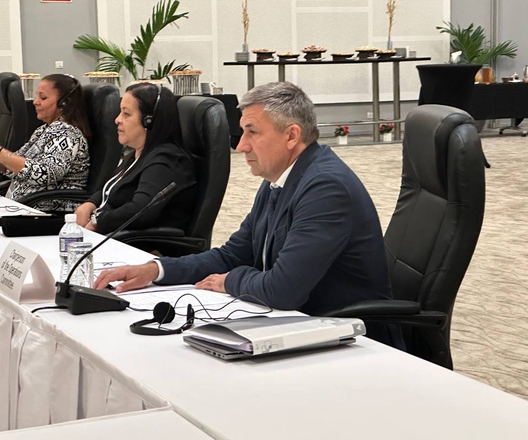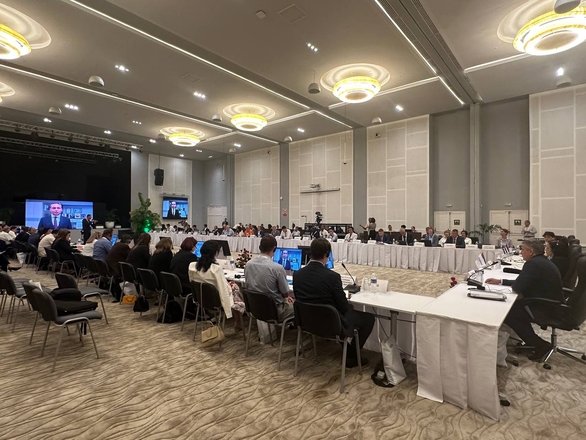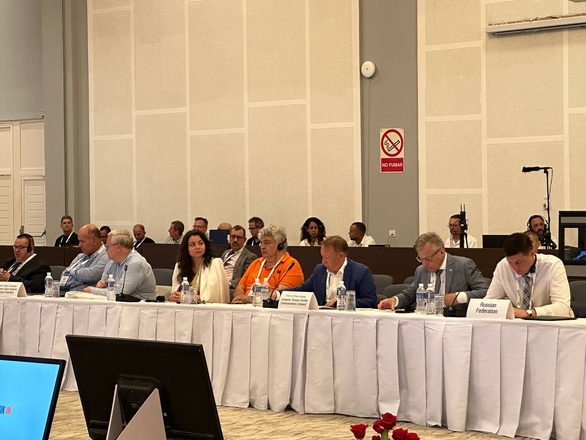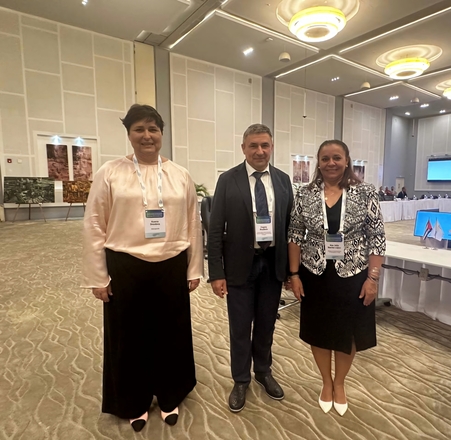Leap into the future of the satellite industry: Deputy General Director of RSCC Evgeny Buidinov spoke about the development of the space communications industry at the Intersputnik session
The satellite industry is expected to double: this is due to increased vertical integration of the market, increased capacity and expanded options for services provided by operators. Companies understand that their success directly depends on the scope and quality of services provided, so now more than ever it is important to comply with global trends and strive to fully meet demand. Evgeny Buidinov, Deputy General Director for Communications Systems Development and Operation of RSCC, Chairman of the Intersputnik Operations Committee, gave an overview of new trends in the space communications industry during the joint 52nd session of the Board and 27th session of the Operations Committee of the international organization. The event took place from June 25 to 27 in the Republic of Cuba at the invitation of the Ministry of Communications of the Republic.
General Director of Intersputnik Ksenia Drozdova opened the joint session. She also made a report on the main results of the organization's activities for the year. The Minister of Communications of the Republic of Cuba, Mayra Arevich Marín, also attended the opening ceremony.
In his report, Evgeny Buidinov focused on new services that can expand the global satellite communications market. "The D2D (satellite-smartphone) technology has received a new impetus for development, which has literally grown from a promising service to a real one, albeit limited so far. According to NSR, by 2030 this market will increase to an average of 386 million active subscribers per month," Evgeny Buidinov said at the plenary session of the event. At the same time, such major players as AST SpaceMobile and Lynk Global consider D2D only an extension of the capabilities of the cellular network and see themselves exclusively as partners of mobile operators. In addition to these two leaders of the field, Starlink is also launching its own Direct-2-Device communication tests in 2024, and new Snapdragon modems can already work with the Iridium system. From some smartphones, you can send a distress signal via Globalstar or Beidou. The startup Omnispace is working on 5G NTN technology in space. Thus, D2D has every chance to become one of the most popular satellite applications.
The development of multiorbital services is different: operators have been discussing its prospects for several years, but the commercial launch of the offer on the market is still on the way. If earlier there was a debate about the individual advantages of NGSO and GEO, now preference is given to intermediate and combined strategies. Industry representatives choose the path of diversification and the use of a combined architecture.
"Combining the capabilities and resources of different satellite systems to ensure seamless operation is a technically difficult and expensive task. Therefore, multiorbital services will be in demand mainly where an uninterrupted connection is needed, regardless of its cost," concluded the Deputy General Director of RSCC.
Evgeny Buidinov also touched on the trend for Software Defined Satellites (SDS), which have already moved from the stage of single projects to the stage of serial production. The next step is to create software-defined networks. With SDS, providers will be able to manage network devices and services using software, configure and optimize, dynamically allocate resources, move beams, redirect traffic and adjust network configurations, as well as quickly implement new services, protocols and functions without major hardware changes. In addition, using SDS, you can update the functionality of the services by downloading software and without changing the hardware.
Evgeny Buidinov also touched upon the development of the satellite IoT market, the advantages of small spacecraft, including in geostationary orbit, as well as the industrialization of spacecraft production.
Delegations from the Republic of Belarus, the Republic of Bulgaria, Hungary, the Socialist Republic of Vietnam, the Republic of India, the Republic of Kazakhstan, the Republic of Cuba, the Kyrgyz Republic, the Lao People's Democratic Republic, the Republic of Nicaragua, the Russian Federation, the Federal Republic of Somalia, and the Czech Republic took part in the events of the joint session of the Intersputnik. Timothy Adi Ashong, Director General of the Regional African Satellite Communications Organization (RASCOM), participated in the session as an observer. Ana Julia Marine López, Vice Minister of Communications, was elected as the new Chairperson of the Intersputnik Board.
Representatives of RSCC also held a number of meetings in Havana with operators and telecom companies of Cuba to expand satellite business and organize new joint projects in the region.



